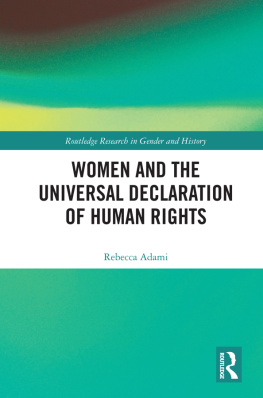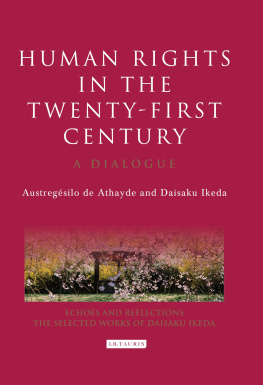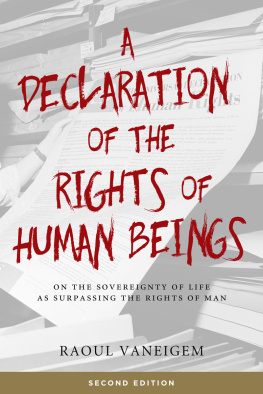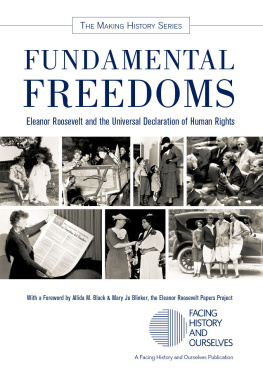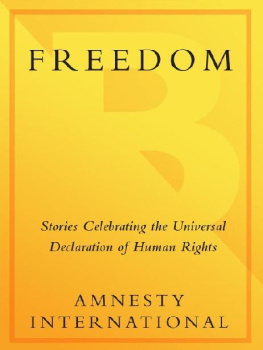The Universal Declaration of Human Rights and the Challenge of Religion
Copyright 2017 by
The Curators of the University of Missouri
University of Missouri Press, Columbia, Missouri 65211
Printed and bound in the United States of America
All rights reserved. First printing, 2017
ISBN: 978-0-8262-2084-4
Library of Congress Control Number: 2016937790

This paper meets the requirements of the American National Standard for Permanence of Paper for Printed Library Materials, Z39.48, 1984.
Typefaces: Jenson and Fontin Sans
ISBN-13: 978-0-8262-7361-1 (electronic)
For the Drew University seminar students with whom I first explored the arguments presented in this book
Acknowledgments
The first person I need to thank is Nicholas Wolterstorff, Noah Porter Professor Emeritus of Philosophical Theology at Yale University. He read the entire manuscript and engaged me in discussions on those parts where I dissent from his views. We did not come to full agreement, but his responses to my queries deepened my understanding of the doubts that many devout people have about the secular underpinnings of belief in human rights. I thank Elliot Sober, the Hans Reichenbach Professor and William F. Vilas Research Professor in the Department of Philosophy at the University of Wisconsin, for correcting the way I use his theory of evolutionary altruism in . I thank them both.
In the fall of 2013 Marie Juul Petersen of the Danish Institute of Human Rights invited me to a workshop on the Organization of Islamic Cooperation and human rights. I thank her for that invitation and for letting me use some of her own work in . David Hawk is past executive director of AI-USA and an adjunct lecturer at Hunter College of the City University of New York. Between stints as a lead investigator of human rights violations in North Korea he took the time to comment on my entire manuscript, for which I am grateful. Not to be forgotten for their support and critiques are the two anonymous readers for the University of Missouri Press.
On the home front I begin by once again thanking my wife, Nancy, for creating a wonderful reading and writing environment. I thank the members of the Drew University Philosophy and Political Science Departments for their comments on relevant sections of this book and for their interest in my work over these many years. I also want to thank the staff of the Drew Library and Instructional Technology Center for their help with preparing the manuscript for submission.
These people are all part of an institution that for more than forty years gave me a wonderful place to work. It allowed me to explore the material in this book in evening seminars with small groups of students. I cherish those discussions and dedicate this book to these Drew students.
INTRODUCTION
The Declaration and Our Secular World Order
What Charles Taylor has called the Modern Moral Order (MMO) that we inherited from the Enlightenment is a very fragile and contested one. Internationally we are not sure when the United Nations or some coalition of its willing members should or should not interfere in the internal affairs of a sovereign nation-state. Domestically many nations struggle with finding the right balance between a statecraft that needs to hold the ship of state upright and the forces of religion that clamor for their say in this project. Just as likely secular forces seek a say in building that ship so that it is not made up merely of religious planks. Below that national level, domestic groups within nations also struggle for their own cohesiveness. Varieties of secularism struggle to find the common language that runs through their diverse agendas for redirecting the ship of state on which they sail. Theologians from within different enclaves struggle to find a common language that captures their diverse engagements with the world. Going below deck we find that activists in the street also have no common language with which to express their shared resentment of the MMO under which they live. If that were not so, the Occupy movement would have jelled into a political program more than it has so far. This book offers the language and ideology of human rights as tools that might get these groups on different international, domestic, and local levels to talk to each other in the same language and so help shore up the fragility of our modern world order.
It is a fragile one. The storms that batter this inherited MMO are shared by all nations and all peoples around the globe. We are all struggling with a globalized economic order that starves millions of people to death and pushes millions more to the margins of their societies. We are fearful of changes in the worlds climate and what those might mean for the future of our planet and the sustainability of our national economies and styles of life. We are all caught by global population movements that drastically change the makeup of our populations. But we do not have enough of a common language with which to discuss the problems and fears we share. It is that lack of a common or shared language that this book seeks to remedy, and the remedy offered is the language of human rights and some of the thinking behind that language. This language has been around since the adoption of the Universal Declaration of Human Rights in the late 1940s. It was placed into the Global Commons by repeated and reiterated UN-sponsored regimes and practices. Unfortunately, the language of human rights that accompanies those international practices has not yet penetrated deeply and widely enough into the secular and religious perspectives that individual thinkers are bringing to bear on solving our shared problems and fears. The result is a scattering of our energies and a waste of our intellectual and practical powers.
Obviously I cannot name and address the numerous thinkers who are working on these shared global problems or name all the different groups with their crucially important agendas for change. My goal therefore is the much narrower one of trying to make the two largest generic groupsthe secular and the religious onesrealize that they can and should share this language of human rights in their attempts, as Emil Fackenheim put it, To Mend the World. Fackenheim had in mind the post-Holocaust world, and in his book he charged that theologiansand, one could add, secular theoristshave too often turned their gaze away as they passed the gates of Auschwitz. The horrors perpetrated there make this averting of ones theoretical gaze understandable, but I remind the reader that that same Holocaust also gave us the language of human rights, the very language we need to pick up the pieces of the MMO after what happened in the camps. Sharing this language may help cut down on waste and speed up our joint effort of fixing or replacingif that be neededthe MMO of our world. Being a theorist of human rights and not enough of an activist, I confine myself to that which I know best, and what I know best is how the Modern Moral Order we inherited from the Enlightenment was made more deeply moral, far beyond Enlightenment dreams, by the text and the thinking of the Universal Declaration of Human Rights.
As arguably the most important sociopolitical document of the twentieth century, the imprint the Declaration has placed upon our world is huge. It has given birth to an entire new branch of international human rights law, put its stamp on scores of national constitutions, and served as the moral feeding ground for millions of reformers and rebels or just plain progressive leaders. It has been translated into even more languages than has the Bible. This book explains the secular nature and scope of this world wide imprint and defends it against the challenges of religion. seeks to bring the two sides closer together through a deeper philosophical dialogue.
 This paper meets the requirements of the American National Standard for Permanence of Paper for Printed Library Materials, Z39.48, 1984.
This paper meets the requirements of the American National Standard for Permanence of Paper for Printed Library Materials, Z39.48, 1984.


